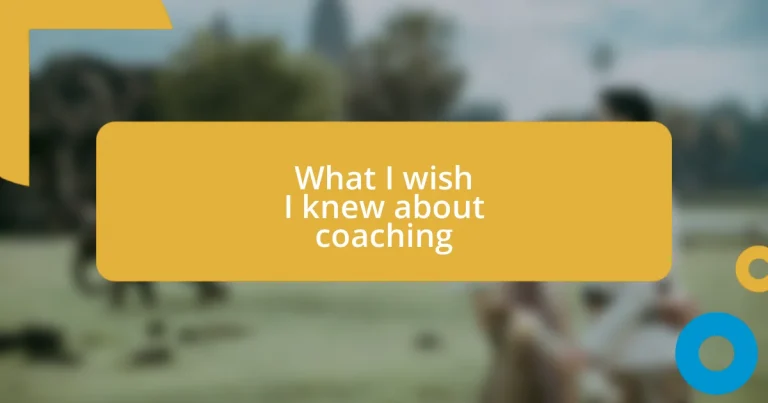Key takeaways:
- The initial assessment phase is crucial for understanding clients’ goals and challenges, setting the stage for effective coaching.
- Key coaching skills such as active listening, effective questioning, and goal setting are essential for fostering client growth and trust.
- Continuous improvement through feedback and collaboration enhances coaching effectiveness and strengthens coach-client relationships.
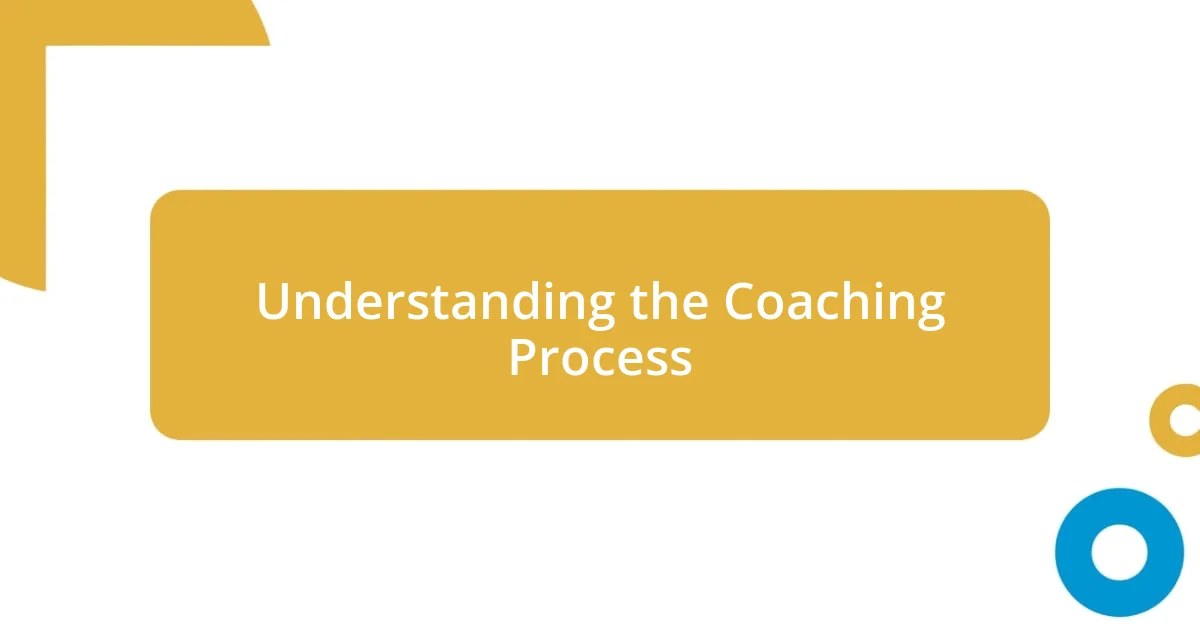
Understanding the Coaching Process
Understanding the coaching process is like navigating a journey toward self-discovery and growth. In my own experience, when I first began coaching, I underestimated how crucial the initial assessment phase would be. Isn’t it fascinating how taking a moment to truly understand someone’s goals and challenges can lay the groundwork for transformative coaching sessions?
As I delved deeper into coaching, I learned that effective communication plays a pivotal role. There were times when I thought I knew what my clients needed based on their surface-level issues, but that was often a misconception. How often do we uncover new layers of insight through open dialogue? I quickly realized that asking open-ended questions not only guided the conversation but also empowered my clients to find their own solutions.
One of the most enlightening aspects of the coaching process is the importance of setting actionable goals. I remember a client who struggled with vague aspirations. It wasn’t until we broke those down into specific, measurable steps that they began to feel a sense of progress. Can you recall a time when a clear path made all the difference in your journey? The empowerment that comes when clients recognize their own potential is truly a rewarding part of being a coach.
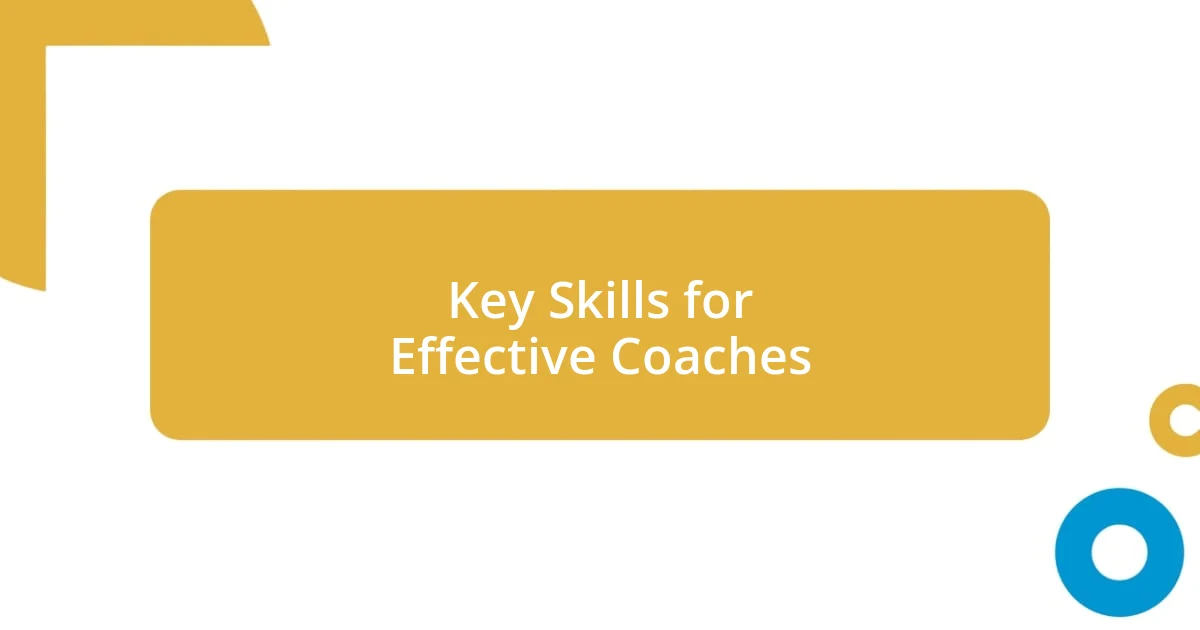
Key Skills for Effective Coaches
Effective coaching hinges on a blend of essential skills that not only enhance the coach-client relationship but also facilitate remarkable growth. From my experience, I’ve realized that emotional intelligence plays a key role in this dynamic. Understanding and empathizing with a client’s feelings allows me to create a safe space for them to explore their challenges. An instance that stands out for me was when a client opened up about fear of failure; in that moment, my ability to resonate with their emotions fostered trust and sparked a productive dialogue.
Here are some vital skills that can make a coach truly effective:
- Active Listening: This involves fully concentrating, understanding, and responding to clients. I find that clients often share more when they feel genuinely heard.
- Effective Questioning: Asking the right questions can lead to powerful insights. I often employ techniques like the Socratic method to encourage deep critical thinking.
- Goal Setting: Helping clients craft realistic goals keeps motivation high. I still remember the satisfaction when a client achieved a significant milestone after we carved out measurable steps together.
- Adaptability: Each client is unique, and being flexible in my approach has proven invaluable. Whether adjusting my style or experimenting with different techniques, adaptability keeps the process fresh and relevant.
- Feedback: Offering constructive feedback helps clients reflect and grow. I’ve seen how receiving tailored feedback can motivate clients to push themselves further than they thought possible.
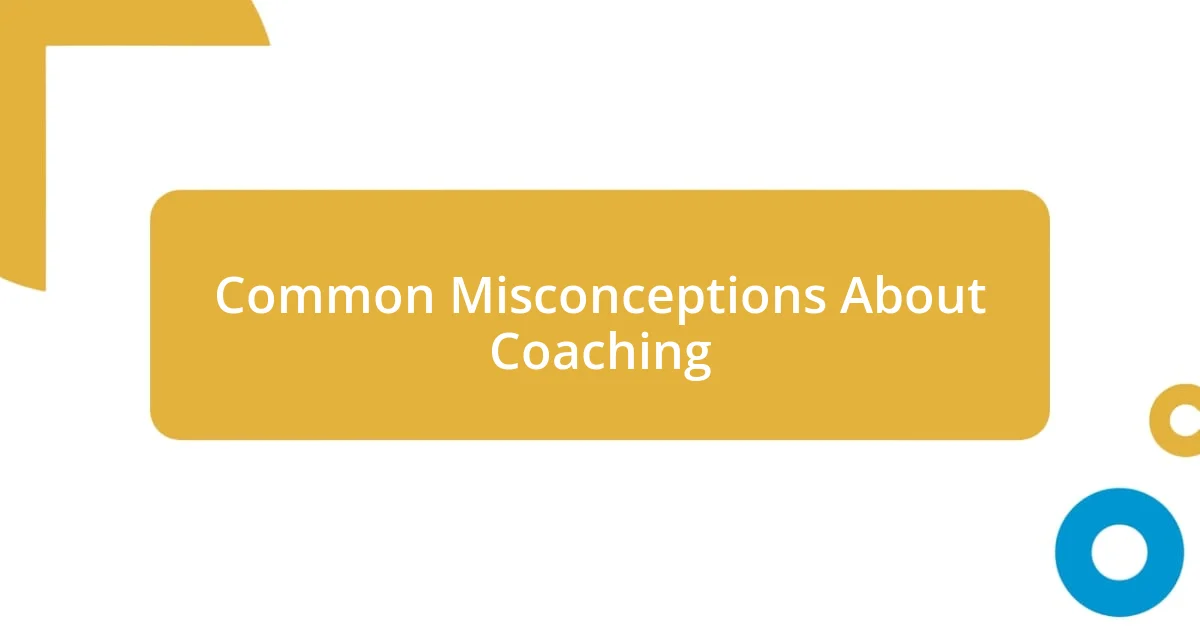
Common Misconceptions About Coaching
Certainly! Here are the paragraphs and the comparison table for the section on “Common Misconceptions About Coaching.”
It’s often said that coaching is synonymous with counseling or therapy, which couldn’t be further from the truth. While both fields share a focus on personal development, coaching is more about guiding individuals toward achieving their goals rather than delving deep into past traumas. From my perspective, a coach acts more like a facilitator who helps clients navigate their future, rather than a healer focused on their past.
Another common misconception is that coaching provides quick fixes to problems. I remember when I first began coaching, I naively thought clients would experience instant transformations. However, I soon realized true change requires consistent effort over time. Change is a journey, not a sprint, and success comes from dedication, not shortcuts.
Lastly, some believe that hiring a coach signifies weakness or an inability to manage one’s life. In my experience, reaching out for coaching is actually a testament to personal strength and a desire for improvement. It takes courage to seek help and acknowledge that our goals may be best achieved with support. Embracing this idea can open doors to incredible personal growth.
| Misconception | Reality |
|---|---|
| Coaching is the same as therapy | Coaching focuses on future goals, while therapy explores past traumas. |
| Coaching offers quick fixes | Change takes time and consistent effort. |
| Hiring a coach indicates weakness | Seeking coaching shows strength and a desire for growth. |
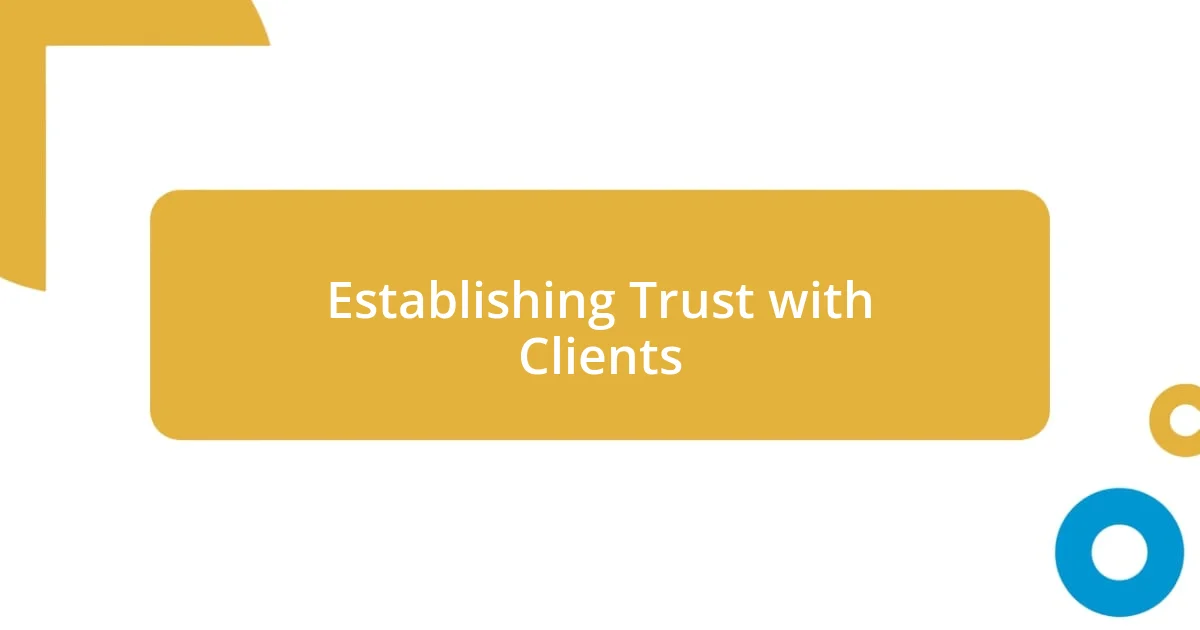
Establishing Trust with Clients
Building trust with clients is a delicate process that requires authenticity and consistency. I remember working with a client who was initially hesitant to share personal goals. I made it a point to share my own experiences and struggles, which made them feel less alone. When I let my guard down, they reciprocated, and trust began to flourish.
Establishing rapport goes beyond surface-level interaction; it’s about creating a genuine connection. I often remind myself to be fully present in conversations. Have I ever found myself distracted during a session? Yes, and I quickly learned how detrimental that was. When clients see that I value their time and confide in them, it fosters an atmosphere of mutual respect and understanding.
One technique I’ve found invaluable is setting clear boundaries while also being approachable. I always clarify what clients can expect from me, but I make sure they feel comfortable reaching out with any concerns. This balance has helped countless clients feel safe to express their thoughts, enabling deeper discussions. The moments when clients share their vulnerability are the ones that highlight the profound trust we’ve built together.
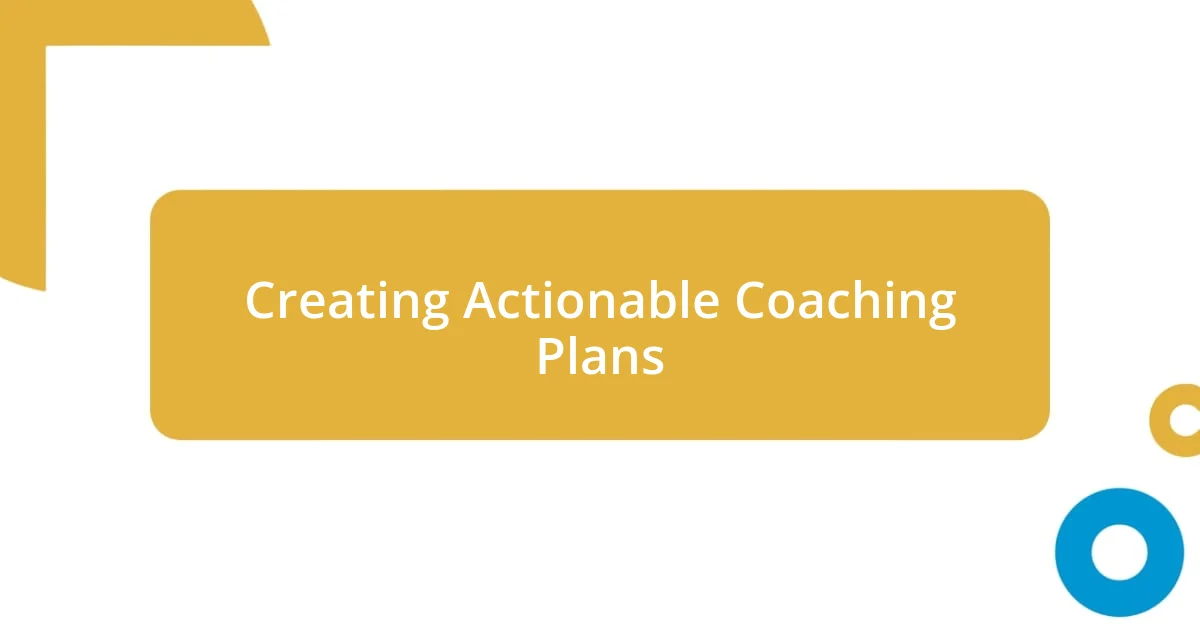
Creating Actionable Coaching Plans
Creating actionable coaching plans is all about clarity and structure. When I first began crafting these plans, I often jumped into goal-setting without a clear framework. However, I learned that a well-defined roadmap is crucial. It helps both the coach and the client stay focused, ensuring that every action step aligns with long-term objectives. Have you ever looked back at a chaotic project and wished for a clear guide? That’s why establishing clear milestones in a coaching plan is essential.
I vividly remember a client who was overwhelmed by their aspirations. They had big dreams but weren’t sure how to break them down into actionable steps. Together, we outlined a plan with small, manageable tasks that led to significant progress. Watching their confidence grow as they checked off each milestone was incredibly rewarding for both of us. It’s moments like these that affirm the value of actionable plans; they transform overwhelming dreams into achievable targets.
Reflecting on my experience, I believe that regular check-ins are vital for keeping the momentum going. At the end of each session, I ask clients to reflect on what they accomplished and what challenges they faced. This not only holds them accountable but also fosters a sense of partnership in their journey. Have you considered how reflection can enhance your coaching experience? Making time for these conversations creates a deeper understanding of each client’s unique path, allowing for adjustments that cater to their evolving needs.
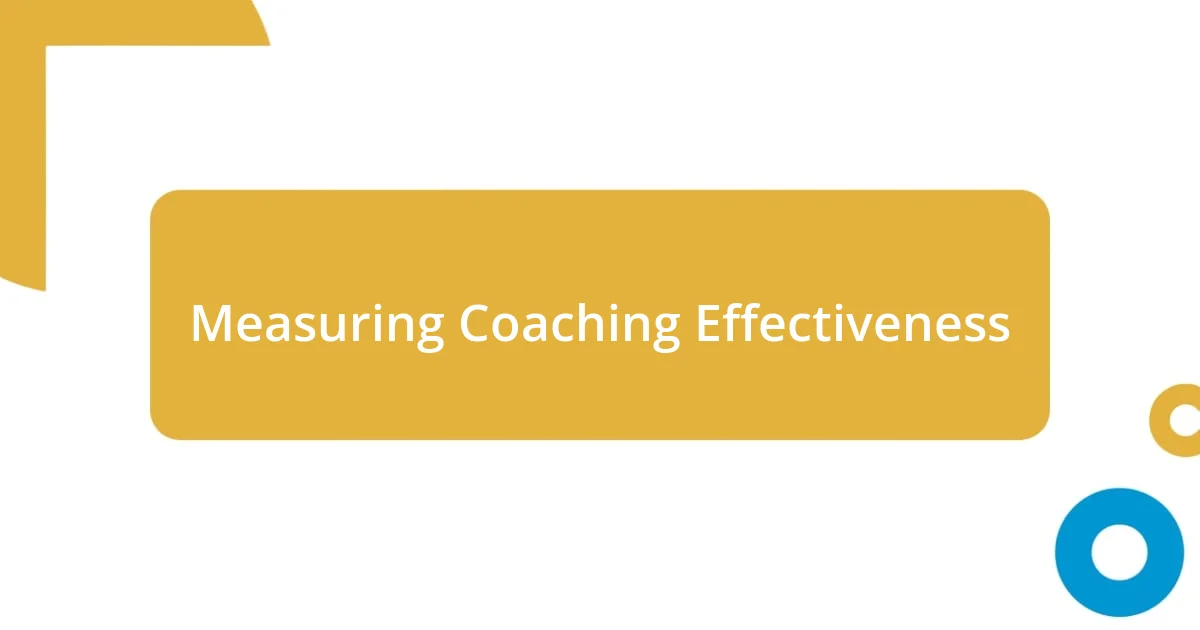
Measuring Coaching Effectiveness
Measuring coaching effectiveness can feel daunting, but I’ve learned it’s all about defining clear metrics from the outset. In my early days, I glanced over this aspect, thinking client satisfaction alone would suffice. However, I discovered that implementing specific benchmarks not only clarified progress but also empowered clients to visualize their journey. When have you seen your own progress clearly? It’s motivating, right?
A practical example from my experience involved a client struggling with self-confidence. We set measurable goals around public speaking engagements, and I encouraged them to track improvements in their comfort level. Each time they shared their experiences in our sessions, I could gauge their effectiveness based on not just their enthusiasm, but also the frequency of their practice sessions. It was enlightening for both of us to witness their growth in real-time.
Reflecting on this, I find it vital to regularly assess these metrics. Are the goals still relevant? Are we focusing on the right areas for growth? In my practice, I’ve instituted a semi-annual reflection where clients revisit their initial goals and consider new challenges. This ensures the coaching process stays dynamic and responsive. What’s your approach to measuring success in your journey? Finding the right balance between guidance and flexibility can truly enhance the coaching experience.
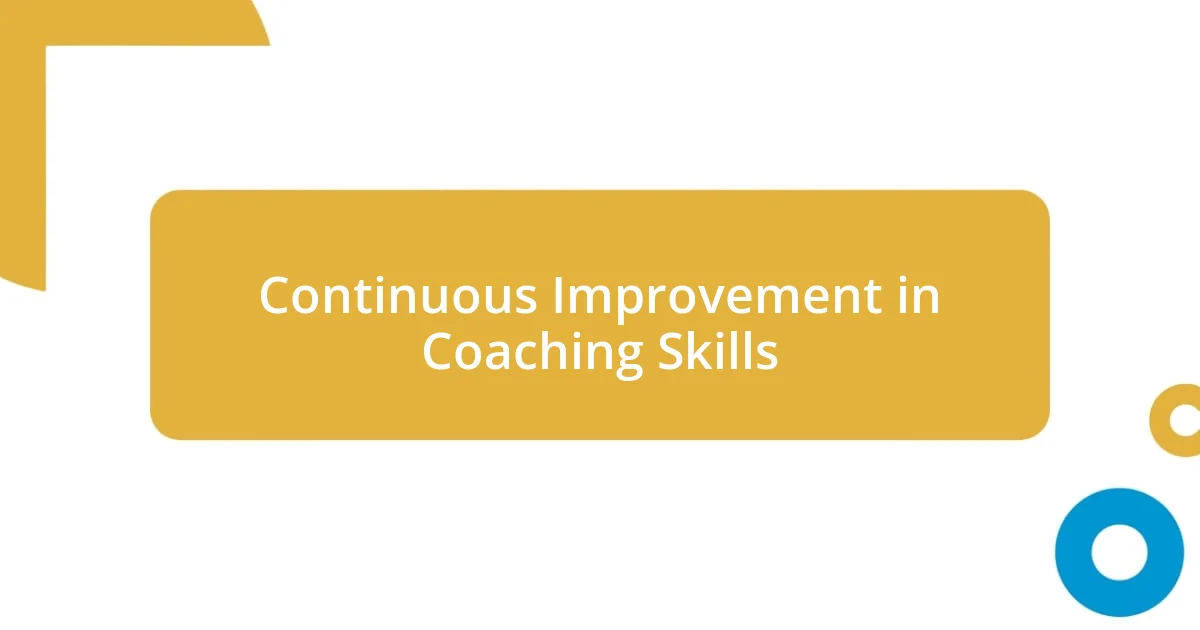
Continuous Improvement in Coaching Skills
Continuous improvement in coaching skills is a journey that never truly ends. I remember taking a workshop on active listening, something I initially thought I was good at. Yet, I was surprised to discover that subtle shifts in how I engaged with my clients could lead to profound changes in their openness and honesty. Have you ever noticed how a simple adjustment in your approach can create a ripple effect in understanding? It’s enlightening, isn’t it?
In my coaching practice, I’ve committed to seeking feedback after each session. This was something I hesitated to do at first, fearing criticism. However, I found it was humbling and incredibly empowering. Clients often share insights that I never would have considered, helping me refine my techniques and approaches. It’s like having a mirror that reflects not just my strengths, but also the areas I can grow. How often do you ask for feedback in your interactions? That willingness to listen is essential for progress.
Participating in peer coaching circles has been another transformative experience for me. We’d share cases and discuss challenges, gaining different perspectives that enhanced our collective knowledge. I recall one intense session where we tackled a particularly difficult client scenario together, exchanging strategies and solutions. The camaraderie and support reminded me that continuous improvement is not just a solo endeavor; it thrives in collaboration. Isn’t it comforting to know that we don’t have to navigate this journey alone?












